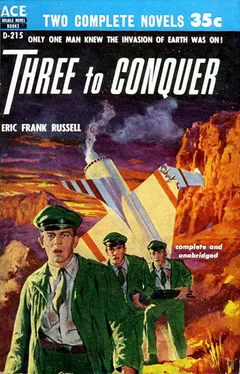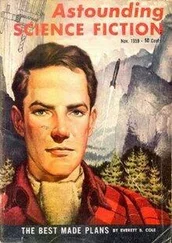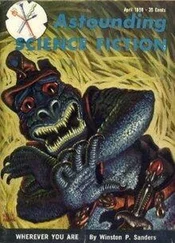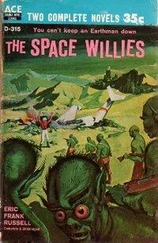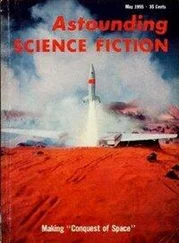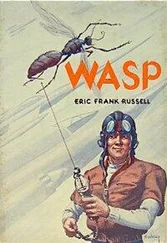In the few seconds that Riley spent mulling these problems, Harper strove to cope satisfactorily with some of his own. By dexterous use of leading comments, how much could he get out of Riley without giving himself away?”
“No,” agreed Harper. “It hasn’t gained them a cent so far.”
Refusing to be stalled, Riley took it further. “Except that they’ve wiped out a couple of boys named Baum. We got a routine report from a patrolman about that. It wasn’t an auto accident, no matter what the official version says. It was the result of a fracas in which you were involved.”
Harper offered no remark.
“Maybe it’s no business of mine,” Riley went on, with just the right mixture of resentment and persuasiveness, “but if I knew how and why the Baums were finished, it might give me a lead to this McDonald.”
“Why?” asked Harper, looking straight at him. “Is there any connection?”
“You know there is; it’s all part of the same crazy business.”
“Who says so?”
The other’s mind had a moment of confusion, born of sudden need to cast doubt on what it knew to be true.
“Well, isn’t it?”
“Maybe and maybe not,” said Harper, keeping a perfectly expressionless face.
“Damn it, if you don’t know what’s going on, who does?”
Harper side-stepped the trap, feeling cold down his back as he did it.
“All I can tell you is that they were known to have become pally with McDonald; therefore, they were wanted for questioning. Immediately they were spotted they fled for dear life, and one thing led to another.” He paused, fought cunning with cunning by adding as a mystified afterthought, “It beats me completely. They weren’t accused of a major crime, so why did they flee?”
Turmoil grew strong in the opposing brain. It had been asked the very question to which it desired the answer, as a matter of life or death. The assumed holder of the secret was seeking the solution himself.
Why did they flee?
Why did they flee?
Round and round whirled the problem, and persistently threw out the only answer—namely, that the Baums had run because they’d become known and had realized how they’d become known. Therefore the mode of identification must be self-revealing; the possessed could not be fingered without sensing the touch.
Yet, now that it was put to actual test there was no recognition, no dramatic exposure, no feelable contact, no touch, nothing.
What’s the answer to that?
“As a guess, divide this world’s bipeds into types A and B. The former is vulnerable because identifiable by some method yet to be discovered. Joyce Whittingham was of that type. So were the Baums. So might others be. But for unknown reasons, type B is impervious to the power of Harper and any who may share that power. By sheer good fortune, this body called Riley happen to be of that kind.”
So the alien thought-stream ruminated while Harper listened, mentally thanking God that it had retained its pseudo-human role and not switched to trans-spatial double-talk.
It went on, “ If this notion should be correct, then salvation lies around the corner. We must learn the critical factor that protects type B and how to distinguish one type from another. Henceforth we must take over only type B. The vulnerable ones can be dealt with afterward.”
Determined to make the most of his opportunity while it lasted, Harper went on, “Someone once remarked that the only difference between those in prison and those outside is that the latter have never been found out. Possibly the Baum brothers had something on their consciences and wrongly supposed it had been discovered. So they ran like jack rabbits.”
“Could be,” admitted Riley, while his thoughts said, “ It doesn’t fit the facts. They had no cause for flight other than realization of betrayal. Harper knew them for what they were, but refuses to admit it. That is at least consistent of him. He always did keep a tight mouth about his power.” A pause, followed by, “ Yet at the moment he lacks that power. Why? The reason must be found!”
“Anyway, what’s the use of gabbing?” Harper continued, craftily spurring the other on. “Talk gets us nowhere, and I have work to do.”
“You can’t give me one useful hint concerning McDonald?”
“No. Go look for him yourself. You’ll get plenty of kudos if you nail him. Besides, he may lead you to Gould, who is wanted just as badly.”
“Gould?” Riley stared across, thinking, “ Do they know or suspect that he is in this town?”
“And his contacts,” added Harper, panning for pay dirt. “Every one of them for the past three months.”
The result was disappointing. He got fleeting, fragmentary pictures- of a score of people without any means of determining who they were, or where they lived, or what parts they were playing in this struggle for a world.
“When Gould and McDonald have been fastened down good and tight,” he went on, “we may then have time to seek afresh for Alderson’s killer, and try for that five thousand you covet.”
He was doing fine. The reference to Alderson brought the hoped-for reaction: a fragment of memory radiated with vividness. McDonald holding Joyce Whittingham while Gould sank a needle into her arm. Joyce struggling and screaming. A police cruiser suddenly halting right behind. Alderson jumping out and making for the Thunderbug. Langley pulling a gun and dropping him before he could intervene. So Langley had done it.
Hah! That brought up something else of considerable significance. The country’s entire forces of law and order, Riley included, had been alerted to capture three men, not two.
Daringly, Harper rushed the issue. “As for Langley, nobody need worry about him any more.”
Riley said nothing vocally but did utter a mental, “ Of course not. He’s finished.”
“Who told you?” asked Harper.
“Told me what?”
“About Langley?”
“I don’t know what you mean; nobody has said anything to me concerning him.”
“I’ve just mentioned that Langley is out of the running,"’ Harper reminded him. “You made no remark, showed no surprise. So I took it for granted that it was old news to you, though I can’t imagine how you got hold of it.”
“You’re wrong,” contradicted Riley, hastening to cover up a minor blunder. “It’s the first I’ve heard of it. The information failed to sink in.”
He was too late. His mind had lagged seconds behind Harper’s wits and his tongue had come last in the field. Despite intervening hundreds of miles, Riley had known of Langley’s end the moment it occurred. He had sensed it as surely as one may gaze across a valley at night and see a distant light become suddenly extinguished.
The same sense could detect a dreadful urgency radiated by another, the equivalent of a cry for help. It was strictly non-telepathic. A psi-factor. In effect, Riley could look afar, see it winking a summons for assistance, see it go dark. No more than that.
Perhaps it was the ultimate form of what Earth called the herd instinct. An alien protective device, evolved on another world where survival sometimes demanded a rapid gathering of the clans and the lone individual went under.
Therefore, elsewhere they must have a natural enemy.
What could it be? The datum was precious enough to be worth discovering, if it could be gotten. But how to get it? How could Harper entice it from a hostile and wary mind without giving himself away? How can one question a Venusian concerning the fauna and flora of Venus, while successfully managing to uphold the pretense of regarding him as a natural-born native of Earth?
Wetting his lips, he said, “Langley and some other fellow were trapped. They shot it out like madmen. It proved impossible to take them alive.”
Читать дальше
